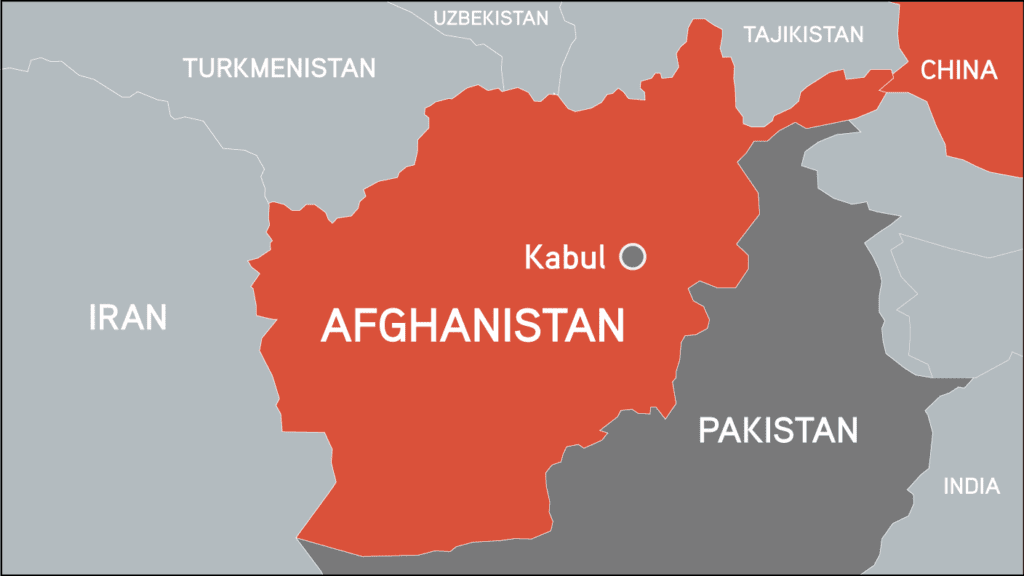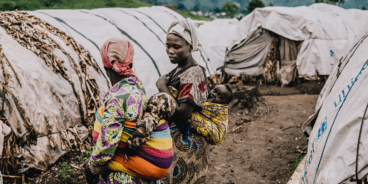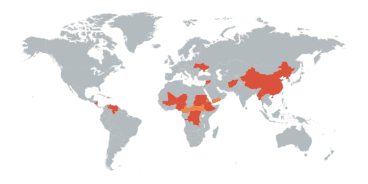
Afghanistan
Populations in Afghanistan are facing systematic human rights violations perpetrated by the Taliban de facto authorities. Other armed extremist groups also continue to pose a threat to civilians.
BACKGROUND:
Since Taliban forces effectively overthrew the Afghan government in August 2021, the Taliban and various armed groups, including the so-called Islamic State in Iraq and the Levant-Khorasan (ISIL-K), have committed widespread and systematic human rights violations and abuses throughout the country.
The Taliban de facto authorities have implemented restrictive policies and practices that deny women and girls their human rights, perpetuating extreme forms of gender-based discrimination and flagrantly violating the Convention on the Elimination of All Forms of Discrimination Against Women (CEDAW). Over 50 sweeping repressive edicts and decrees targeting women and girls severely limit freedom of movement, freedom of opinion and expression, employment opportunities, political and public representation and access to education and healthcare. According to the UN Special Rapporteur on the situation of human rights in Afghanistan and the Working Group on discrimination against women and girls, the Taliban de facto authorities may be perpetrating gender persecution and gender apartheid as they appear to be governing through systematic discrimination with the intent to subject women and girls to total domination. Women’s rights activists and gender equality advocates have faced targeted killings, enforced disappearances, incommunicado detention, attacks and harassment.
The Human Rights Service of the UN Assistance Mission in Afghanistan (UNAMA) verified over 3,774 civilians killed or wounded from 15 August 2021 to 30 May 2023, mostly in deliberate attacks. Many of these attacks were attributed to ISIL-K, and over 1,218 of the documented civilian casualties occurred in attacks with improvised explosive devices (IEDs) on places of worship. ISIL-K frequently claims attacks that target Shia Hazara, other Shia Muslims, Sufi Muslims, Sikhs and other minorities. Individuals from ethnic and religious minority communities have been arbitrarily arrested, tortured, summarily executed and forced to flee. The UN Special Rapporteur reported in September 2022 that attacks against ethnic and religious minorities appear to be systematic in nature and reflect elements of an organizational policy, likely amounting to crimes against humanity.
UNAMA has documented evidence of the Taliban de facto authorities committing extrajudicial killings, arbitrary arrests and detentions, incommunicado detention and torture and ill-treatment against specific groups, including media workers, human rights defenders and individuals affiliated with the former government. UNAMA has reported over 1,600 cases of human rights violations committed during arrests and detentions, including torture and other cruel, inhuman or degrading treatment.
The people of Afghanistan are enduring a severe humanitarian crisis, compounded by the impact of sanctions and the freezing of state assets. In December 2021 the UN Security Council adopted Resolution 2615, allowing for humanitarian aid to flow into Afghanistan without violating UN sanctions against the Taliban, which have been in place since 2011. According to the UN Office for the Coordination of Humanitarian Affairs, two-thirds of Afghanistan’s population need humanitarian aid to survive.
The Taliban were the de facto authorities in Afghanistan from 1996-2001 before they were overthrown by a North Atlantic Treaty Organization coalition of military forces. During two decades of insurgency against the internationally recognized Afghan government, the Taliban perpetrated likely crimes against humanity and war crimes while Afghan security forces and members of the United States (US) military and Central Intelligence Agency (CIA) also committed likely war crimes. In March 2020 the International Criminal Court (ICC) authorized the Office of the Prosecutor to investigate alleged atrocity crimes perpetrated in Afghanistan since 1 July 2002. In September 2021 Chief Prosecutor Karim Khan announced the investigation would focus on crimes allegedly perpetrated by the Taliban and ISIL-K and de-prioritize other aspects, including acts committed by Afghan national security forces, US forces and the CIA.
RECENT DEVELOPMENTS:
Since 1 January 2024 UNAMA has documented a series of arbitrary arrests and detentions of women and girls, particularly those from ethnic and religious minority communities, by the Taliban on the basis of alleged non-compliance with the imposed “Islamic dress code.” Women and girls have reportedly been forcibly taken into police vehicles, arbitrarily detained and held incommunicado while being subjected to ill-treatment. Hazara women and girls have been disproportionately impacted by these violations.
According to UNAMA, Afghan women fear arrest and punishment whenever a new edict is announced by the Taliban due to increased police harassment. The latest edict at the end of March 2024 announced that the Taliban will resume publicly stoning and flogging women to death for alleged adultery.
Ethnic and religious minorities, particularly the Shia Hazara, continue to be systematically targeted in attacks. In recent months IED attacks on minibuses and in mosques have killed dozens of civilians.
ANALYSIS:
The risk of further war crimes and crimes against humanity persists. The targeting of ethnic and religious minorities indicates that the Taliban is likely unable or unwilling to protect vulnerable populations.
The Taliban de facto authorities frequently target journalists, civil servants, human rights defenders and those affiliated with the former Afghan government with violations that appear to be perpetrated on a widespread and systematic basis. Targeted attacks are largely unreported due to the Taliban’s continued crackdown on independent media and a closed civic space. There are currently no independent national bodies to document human rights violations due to the dismantling of key institutions, including the Afghan Independent Human Rights Commission and the Office of the Attorney General.
Efforts by the Taliban to exclude women and girls from social, economic and political spheres, including the institutionalized large-scale gender-based discrimination and violence against them, likely amounts to gender persecution, a crime against humanity. Continued restrictions on fundamental freedoms and a culture of impunity for past and ongoing human rights violations and abuses creates an enabling environment for more severe violations of international law and further atrocity crimes.
RISK ASSESSMENT:
-
- Decades of serious violations of international human rights and humanitarian law, as well as impunity for those crimes.
- Institutionalized large-scale and systematic gender-based discrimination by Taliban de facto authorities against women and girls.
- Widespread and systematic targeted attacks perpetrated by ISIL-K and the Taliban against ethnic and religious minorities.
- Lack of independent media and crackdown on civil society and human rights defenders.
- Weakness of state structures to protect vulnerable populations and an unwillingness of the de facto authorities to uphold obligations under international law.
NECESSARY ACTION:
As the de facto authorities, the Taliban are bound by all existing international human rights obligations codified in the treaties to which Afghanistan is a state party, including CEDAW. They must uphold these obligations, including by halting all violations and abuses perpetrated by their officials and guaranteeing the equal protection and promotion of the human rights of all people in Afghanistan, regardless of gender, ethnic background, religious belief or political affiliation. The Taliban should allow the international community to provide assistance to meet these obligations. Any efforts towards normalization of relations with the Taliban must be contingent on respect for human rights and women’s rights in line with international law.
The Taliban must investigate patterns of human rights violations and take immediate steps to prevent future violations, including by holding perpetrators accountable. It is imperative that the Taliban cooperate with and facilitate access for the Special Rapporteur, UNAMA and the Office of the UN High Commissioner for Human Rights, as well as ensure the safety of humanitarian workers and organizations.
The international community should continue to pursue justice for likely atrocity crimes committed in Afghanistan, regardless of the position, nationality or affiliation of the alleged perpetrator. Ongoing investigations at the ICC should include gender persecution. All UN member states should ensure that UNAMA’s Human Rights Service is sufficiently resourced to carry out its full mandate.



